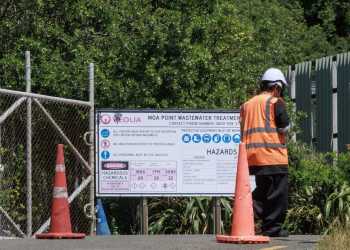Opinion: Government spokespeople have failed to provide evidence or logic to justify their proposed repeal of world-leading smokefree legislation. Instead, they have claimed that reducing retailer numbers from about 6000 to 600 would greatly increase crime, particularly ram raids targeting tobacco products – a claim based on anecdote.
Examination of police data on ram raids suggests these crimes are decreasing and that only a minority target tobacco products. In fact, reducing tobacco retail outlets and denicotinisation would very likely lead to further decreases in ram-raid crimes.
Tobacco companies have strongly resisted the proposal to reduce the number of retail outlets, which would threaten their profits. For example, they funded retailers to prepare a petition, presented on Parliament’s steps to Minister of Internal Affairs Brooke Van Velden, and a social media campaign that opposed plans to reduce outlet numbers. Our analysis of the social media campaign found it substituted logical fallacies and scaremongering for logic and evidence.
Nonetheless, when pressed to explain the decision to repeal the Smokefree Environments and Regulated Products (Smoked Tobacco) Amendment Act legislation, Prime Minister Christopher Luxon drew on tobacco companies’ reasoning and argued the legislation had some “practical issues”. Specifically, he claimed that implementing a retail reduction strategy would see ram raids increase.
Health Minister Dr Shane Reti, who has overall responsibility for tobacco policy, also struggled to justify repealing the retail reduction policy. When asked for evidence that retail crime would increase he cited “concerns” retailers had raised but could not provide empirical evidence.
What is the evidence Luxon and Reti should have considered?
Data informing the questions Luxon and Reti were asked do exist. This shows that ram raid crimes, which the police have tracked over the last six years, are trending downwards; they also show that most ram raids do not target tobacco products. Luxon and Reti need to explain why they propose acting in a way that will be inconsistent with police data.
The graph below shows rams raids rose up until late 2022; however, after that time, ram raids declined considerably, which may reflect the enhanced security measures funded by the last government (e.g., subsidies to install fog cannons). Greater in-store security and external barriers, such as bollards, have likely made ram raids more difficult; where ram raids did still occur, improved security has likely reduced the value of items stolen.
Police data also includes a scanning report on 283 ram raids between November 2020 and October 2021. This report shows that money and the cash till were the most frequently stolen items in ram raids. Overall, three quarters of ram raids during this period did not involve tobacco products.
In summary, analysis of data rather than anecdote shows ram raids are decreasing and that most involve theft of products other than tobacco. There are also compelling logical reasons why implementing the Smokefree Environments and Regulated Products Act measures would decrease ram raids.
First, the legislation requires retailers to go through an approval process before they are eligible to become a smoked tobacco retailer. Among other criteria set, the approval process the Ministry of Health established requires retailers to provide evidence of their store security. Specifically, it seeks details on product storage, security cameras, alarm and fog systems, and external barriers, such as bollards. These measures would ensure all smoked tobacco retailers had highly secure premises for the nine-month period when tobacco products with current nicotine content would still be available (between July 1, 2024 and April 1, 2025).
Second, in April 2025, smoked tobacco retailers would only have been able to sell products that met the new substantially reduced nicotine standard. Reduced nicotine products are much less appealing to people who smoke, which makes it highly unlikely a large black market for these products would exist and largely removes the incentive to steal these products, given their uncertain resale value.
Finally, as tobacco becomes less available and less addictive, many people will try to quit or move to alternative nicotine products, such as vapes. Our studies of people who smoke show many regret smoking, have tried to quit and want to be smoke-free, and anticipate quitting or switching to vaping once the retailer reduction and denicotinisation policies come into effect. Robust modelling also predicts that smoking prevalence is likely to fall dramatically after denicotinisation. As the pool of people who smoke decreases, the market for stolen cigarettes will also reduce, thus reducing any incentive to target these products in burglaries.
Luxon and Reti have failed to provide any evidence that reducing retailer numbers would see ram raids increase and have resorted to “arguments” seeded and propagated by tobacco companies. In fact, the data is clear: reducing the number of outlets selling tobacco, requiring these to meet higher security standards, and introducing denicotinisation would reduce ram raids, enhance public safety, and boost population wellbeing.
Why, or for whom, are they waiting?
This article was adapted from the Public Health Communication Centre’s Briefing Smokefree Laws: Reducing tobacco outlets will decrease crime
Loading PerspectiveSplit analysis...









